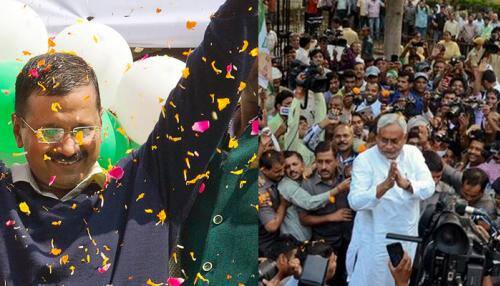- News>
- India
Elections that changed dynamics of Indian politics in 2015

Delhi Assembly Elections
In one of the most striking comebacks in the Indian political history, the Aam Aadmi Party (AAP), led by Arvind Kejriwal, registered a landslide victory in the Delhi Assembly Elections, and knocked the two major parties – Congress and Narendra Modi-led Bharatiya Janata Party - and their veterans from their citadels. The defeat in the Delhi polls, the result of which was declared on February 10, 2015, was the first faced by the BJP since its historic Lok Sabha triumph. The results further saw the Congress, which had ruled the national capital for 15 years till 2013, being reduced to naught.
Out of 70 Assembly seats, the AAP secured 67, limiting the BJP to three only. The BJP had to face more humiliation as its chief ministerial candidate Kiran Bedi lost in the party’s traditional stronghold of Krishna Nagar, which was long held by party veteran Dr Harsh Vardhan. Exactly a year after he quit after ruling the capital for 49 tumultuous days, Kejriwal, the former Revenue Service officer, took oath as Delhi Chief Minister at Ramlila Grounds on February 14, 2015.
Bihar Assembly Elections
In one of the most interesting electoral battles in the recent history, the Janata Dal (United)-Rashtriya Janata Dal-Congress coalition of Grand Alliance recorded a landslide victory in the Bihar Assembly Elections. The elections did not only spell the hat-trick for Nitish Kumar but also witnessed the stunning comeback of Lalu Prasad Yadav’s RJD in the politics of Bihar. Despite leading an aggressive poll campaign and promising to shower huge funds on Bihar, Prime Minister Narendra Modi’s magic failed to write the success story for the BJP. It was the BJP's second straight defeat in state elections since the Aam Aadmi Party trounced it in Delhi in February. Of the 243 Assembly seats, the Grand Alliance won 178 seats (JD(U) 71, RJD 80, Congress 27) and the NDA 58 (BJP 53, Lok Jan Shakti Party 2, Rashtriya Lok Samta Party 2, Hindustani Awam Morcha (1).
Interestingly, the Bihar Assembly Elections were the first state polls after the split of the BJP and JD(U) ahead of 2014 Lok Sabha elections.
Lalu Prasad’s son Tejashwi Yadav, 26, was allocated the portfolios of PWD, and forest and environment while his elder son Tej Pratap, 28, was named the health minister. Tejashwi was named Bihar’s deputy minister too.
Nitish Kumar-led Grand Alliance trumps Narendra Modi's BJP in Bihar
Bihar loss will not affect NDA; Nitish needs to do more for the state: Jaitley
Nitish Kumar beats Narendra Modi: 7 Takeaways from battleground Bihar
Nitish's swearing-in: When Lalu's 9th pass son Tejpratap took two attempts to take oath
Kerala civic polls
The CPM-led Left Democratic Front (LDF) won big in the Kerala local body elections, in which the BJP emerged as an electoral force. The BJP improved its tally not only in village, block and district panchayats but also in municipalities and corporations. The Congress-led United Democratic Front (UDF), which had won 70 percent of the local governing bodies in 2010, lost a number of seats to the CPM and the BJP. Of 941 gram panchayats, the LDF won 550. In municipalities, the BJP’s tally rose from from 79 in 2010 to 236. The BJP won 51 seats in corporations, out of which 34 are in the Thiruvananthapuram corporation alone. The BJP won big in the Palakkad municipality too.
Kerala civic polls: LDF wins majority, UDF suffers setback, BJP makes inroads
Kerala civic polls an eye opener for Chandy
Gujarat civic polls
The Bharatiya Janata Party retained all six city municipal corporations in Gujarat local body polls held in November 2015. This was the first popularity test since Anandiben Patel took over as Gujarat Chief Minister in 2014, after the then CM Narendra Modi moved to Delhi as the Prime Minister. The elections saw Congress making surprise gains in rural and semi-urban areas in the polls. Out of 230, the Congress won 134 taluka panchayat bodies followed by 67 by the BJP. In the city areas, the BJP retained control over Ahmedabad, Vadodara, Surat, Rajkot, Bhavnagar and Jamnagar municipal corporations. Of the 56 municipalities, the BJP grabbed 34 and Congress 11.
The polls were the first in Gujarat in the wake of Patel community protests, demanding quotas in jobs and education.
Civic polls: Congress scores big in rural Gujarat, BJP retains hold in urban pockets
Gujarat local body poll results reflect pattern against BJP: Congress
Kalyan-Dombivali and Kolhapur Municipal Corporation elections
The Kalyan-Dombivali Municipal Corporation (KDMC) elections saw the Bharatiya Janata Party and Shiv Sena fighting separately for the first time since the 2014 Assembly polls. The polls, took
place in November 2015, threw up a hung house, with the Shiv Sena edging past the BJP. The Congress-NCP combine retained power in Kolhapur Municipal Corporation (KMC). Interestingly, Congress and NCP had also fought the polls separately this time.
The Shiv Sena emerged as the single largest party by grabbing 52 of the 122 seats in the KDMC. The BJP stood second with 42 while the Maharashtra Navnirman Sena (MNS) won only nine seats. Shiv Sena's Rajendra Deolekar was later elected unopposed to the post of mayor of the Kalyan-Dombivali Municipal Corporation after Bharatiya Janata Party's candidate Rahul Damble withdrew his candidature. As per the deal between the two parties, which are also in alliance in the state Assembly, Shiv Sena will get the mayor's post for the first 30 months, followed by BJP for 12 months and back to the Sena for 18 months.
In the 81-member KMC, the Congress emerged as the single largest party with 27 seats followed by the NCP with 15. The BJP and allies secured 32 seats, with four going to the Shiv Sena.
Shiv Sena makes veiled jibe at BJP over KDMC poll results
